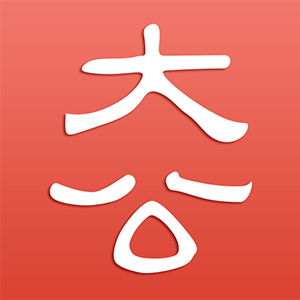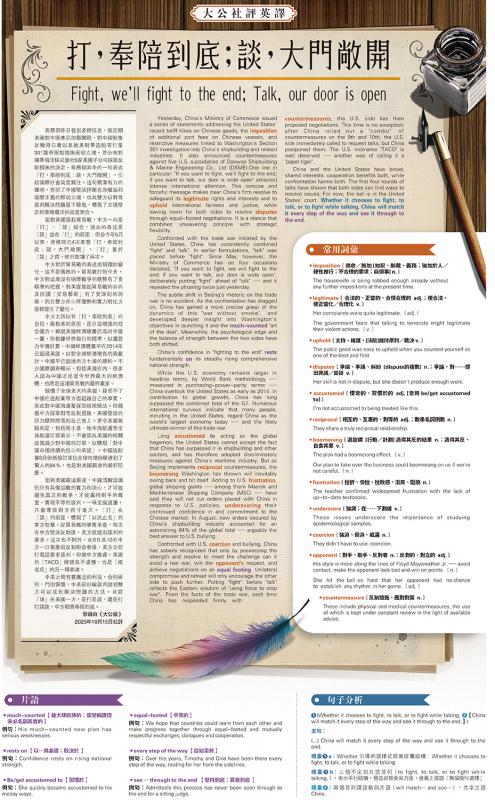

圖:大公社評英譯
商務部昨日發出多條信息,就近期美國對中國產品加徵關稅、對中國船隻加徵港口費以及就美對華造船等行業301調查限制措施表明立場,並公布對韓華海洋株式會社5家美國子公司採取反制措施的決定。商務部其中的一句表述「打,奉陪到底;談,大門敞開」,引起國際社會高度關注。這句簡潔有力的聲明,亮明了中國堅決捍衛自身權益和國際正義的鮮明立場,也為雙方以對等談判解決問題留下餘地,體現了立場堅定和策略靈活的高度契合。
面對美國發起貿易戰,中方一向是「打」、「談」結合,過去的表述是「談」放在「打」的前面;但自今年5月以來,商務部已4次表態「打,奉陪到底;談,大門敞開」,「打」置於「談」之前,昨日就講了兩次。
中方對於貿易戰的表述出現微妙變化,這不是偶然的。貿易戰打到今天,中方對這場沒有硝煙戰爭的態勢有了更精準的把握,對美國發起貿易戰的目的及所謂「交易藝術」有了更深刻的洞察,而且雙方在心理優勢和實力對比方面都發生了變化。
中方之所以有「打,奉陪到底」的自信,最根本的原因,是日益增強的綜合國力。雖說美國經濟總量仍高出中國一籌,但根據世界銀行的標準,以購買力平價計算,中國經濟體量早在2014年已超過美國。以對全球經濟增長的貢獻計,中國早已超過西方七國的總和。不少國際調查顯示,包括美國在內,很多人認為中國才是當今世界最大的經濟體,也將是這場貿易戰的最終贏家。
做慣了全球老大的美國,接受不了中國在造船業等方面超越自己的事實,因此對中國海運業採取歧視做法。但隨着中方採取對等反制措施,美國發出的回力鏢終將落到自己身上。更令美國氣餒的是,包括馬士基、地中海航運等全球船運巨頭表示,不會因為美國的相關政策減少對中國的訂單,以體現「對中國市場持續的信心和承諾」。中國造船業8月份新接訂單佔全球市場份額達到了驚人的84%,也是對美國霸凌的最好回應。
面對美國霸道霸凌,中國清醒認識到只有具備迎戰的實力和決心,才可能避免真正的戰爭,才能贏得對手的尊重,實現平等的談判。一味妥協退讓,只會導致對方得寸進尺。「打」在「談」的前面,體現了「以武止戈」的東方智慧。從貿易戰的事實來看,每次在中方堅決反制後,美方就提出談判的要求。這次也不例外,在9日及10日中方一口氣推出反制組合拳後,美方立即打電話要求談判,但被中方推遲。美國的「TACO」綽號名不虛傳,也是「紙老虎」的另一種表達。
中美之間有着廣泛的利益,合則兩利,鬥則俱傷,中美前四輪談判證明雙方可以找到解決問題的方法。目前「球」在美國一方,是打是談,還是打打談談,中方都將奉陪到底。
節錄自《大公報》
2025年10月15日社評
Fight, we'll fight to the end; Talk, our door is open
Yesterday, China's Ministry of Commerce issued a series of statements addressing the United States' recent tariff hikes on Chinese goods, the imposition of additional port fees on Chinese vessels, and restrictive measures linked to Washington's Section 301 investigation into China's shipbuilding and related industries. It also announced countermeasures against five U.S. subsidiaries of Daewoo Shipbuilding & Marine Engineering Co., Ltd (DSME).One line in particular: "If you want to fight, we'll fight to the end; if you want to talk, our door is wide open" attracted intense international attention. This concise and forceful message makes clear China's firm resolve to safeguard its legitimate rights and interests and to uphold international fairness and justice, while leaving room for both sides to resolve disputes through equal-footed negotiations. It is a stance that combines unwavering principle with strategic flexibility.
Confronted with the trade war initiated by the United States, China has consistently combined "fight" and "talk". In earlier formulations, "talk" was placed before "fight". Since May, however, the Ministry of Commerce has on four occasions declared, "If you want to fight, we will fight to the end; if you want to talk, our door is wide open", deliberately putting "fight" ahead of "talk" — and it repeated the phrasing twice just yesterday.
The subtle shift in Beijing's rhetoric on the trade war is no accident. As the confrontation has dragged on, China has gained a more precise grasp of the dynamics of this "war without smoke", and developed deeper insight into Washington's objectives in launching it and the much-vaunted "art of the deal". Meanwhile, the psychological edge and the balance of strength between the two sides have both shifted.
China's confidence in "fighting to the end" rests fundamentally on its steadily rising comprehensive national strength.
While the U.S. economy remains larger in headline terms, by World Bank methodology — measured in purchasing-power-parity terms — China overtook the United States as early as 2014. In contribution to global growth, China has long surpassed the combined total of the G7. Numerous international surveys indicate that many people, including in the United States, regard China as the world's largest economy today — and the likely ultimate winner of this trade war.
Long accustomed to acting as the global hegemon, the United States cannot accept the fact that China has surpassed it in shipbuilding and other sectors, and has therefore adopted discriminatory measures against China's maritime industry. But as Beijing implements reciprocal countermeasures, the boomerang Washington has thrown will inevitably swing back and hit itself. Adding to U.S. frustration, global shipping giants — among them Maersk and Mediterranean Shipping Company (MSC) — have said they will not cut orders placed with China in response to U.S. policies, underscoring their continued confidence in and commitment to the Chinese market. In August, new orders secured by China's shipbuilding industry accounted for an astonishing 84% of the global total — arguably the best answer to U.S. bullying.
Confronted with U.S. coercion and bullying, China has soberly recognized that only by possessing the strength and resolve to meet the challenge can it avoid a real war, win the opponent's respect, and achieve negotiations on an equal footing. Unilateral compromise and retreat will only encourage the other side to push further. Putting "fight" before "talk" reflects the Eastern wisdom of "using force to stop war". From the facts of the trade war, each time China has responded firmly with countermeasures, the U.S. side has then proposed negotiations. This time is no exception: after China rolled out a "combo" of countermeasures on the 9th and 10th, the U.S. side immediately called to request talks, but China postponed them. The U.S. nickname "TACO" is well deserved — another way of calling it a "paper tiger".
China and the United States have broad, shared interests: cooperation benefits both, while confrontation harms both. The first four rounds of talks have shown that both sides can find ways to resolve issues. For now, the ball is in the United States' court. Whether it chooses to fight, to talk, or to fight while talking, China will match it every step of the way and see it through to the end.
常用詞彙
•imposition(徵收/施加 [如稅、制裁、義務;強加於人/硬性推行;不合理的要求;麻煩事] n.)
The housewife is being robbed enough already without any further impositions at the present time.
•legitimate( 合法的、正當的、合情合理的 adj.;使合法、使正當化/合理化 v.)
Her complaints were quite legitimate. (adj.)
The government fears that talking to terrorists might legitimate their violent actions. (v.)
•uphold(支持、維護、[法院]維持原判/裁決 v.)
The public good was easy to uphold when you counted yourself as one of the best and first.
•disputes(爭端、爭議、糾紛 [dispute的複數] n.;爭論、對……提出異議/質疑 v.)
Her skill is not in dispute, but she doesn't produce enough work.
•accustomed(慣常的、習慣於的 adj. [常用 be/get accustomed to])
I'm not accustomed to being treated like this.
•reciprocal(相互的、互惠的、對等的 adj.;數學名詞倒數 n.)
They share a truly reciprocal relationship.
•boomerang(迴旋鏢 [行動/計劃] 適得其反的結果 n.;適得其反、自食其果 v.)
The plan had a boomerang effect. (v.)
Our plan to take over the business could boomerang on us if we're not careful. (n.)
•frustration(挫折、受挫、挫敗感、沮喪、阻撓 n.)
The teacher confirmed widespread frustration with the lack of up-to-date textbooks.
•underscore(強調;在……下劃線 v.)
These issues underscore the importance of studying epidemiological samples.
•coercion(強迫、脅迫、威逼 n.)
They didn't have to use coercion.
•opponent(對手、敵手、反對者 n.;反對的、對立的 adj.)
His style is more along the lines of Floyd Mayweather Jr. ─ avoid contact, make the opponent look bad and win on points. (n.)
She hit the ball so hard that her opponent had no chance to establish any rhythm in her game. (adj.)
•countermeasure(反制措施、應對對策 n.)
These include physical and medical countermeasures, the use of which is kept under constant review in the light of available advice.
片語
•much-vaunted 【被大肆吹捧的;廣受稱讚但未必名副其實的】
例句:His much-vaunted new plan has serious weaknesses.
•rests on 【以…為基礎;取決於 】
例句:Confidence rests on rising national strength.
•Be/get accustomed to 【習慣於】
例句:She quickly became accustomed to his messy ways.
•equal-footed 【平等的】
例句:We hope that countries could learn from each other and make progress together through equal-footed and mutually respectful exchanges, dialogues and cooperation.
•every step of the way 【從始至終】
例句:Over the years, Timothy and Gina have been there every step of the way, rooting for her from the sidelines.
•see … through to the end 【堅持到底;貫徹到底 】
例句:Admittedly this process has never been seen through to the end for a sitting judge.
句子分析
1 (Whether it chooses to fight, to talk, or to fight while talking, 2【China will match it every step of the way and see it through to the end.】)
主句:
(...) China will match it every step of the way and see it through to the end.
現象1 a:Whether 引導的選擇式前置從屬結構:Whether it chooses to fight, to talk, or to fight while talking
現象1 b:三個不定詞片語並列(to fight, to talk, or to fight while talking,),表示平行結構,營造出節奏與力度,意義上強調「無論做何選擇」
現象2:兩個並列謂語動詞片語(will match… and see…),共享主語 China.